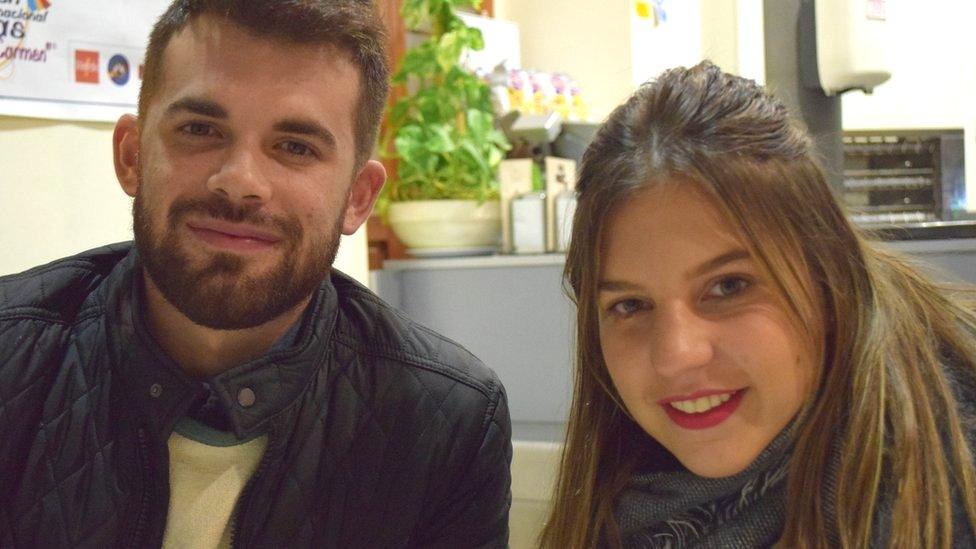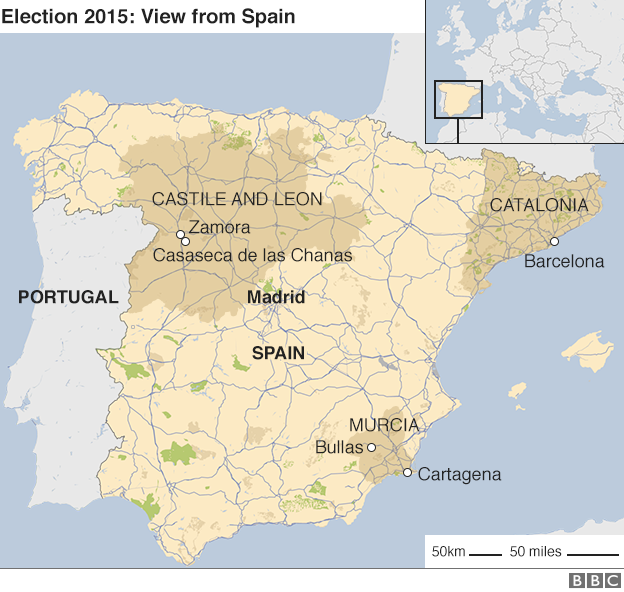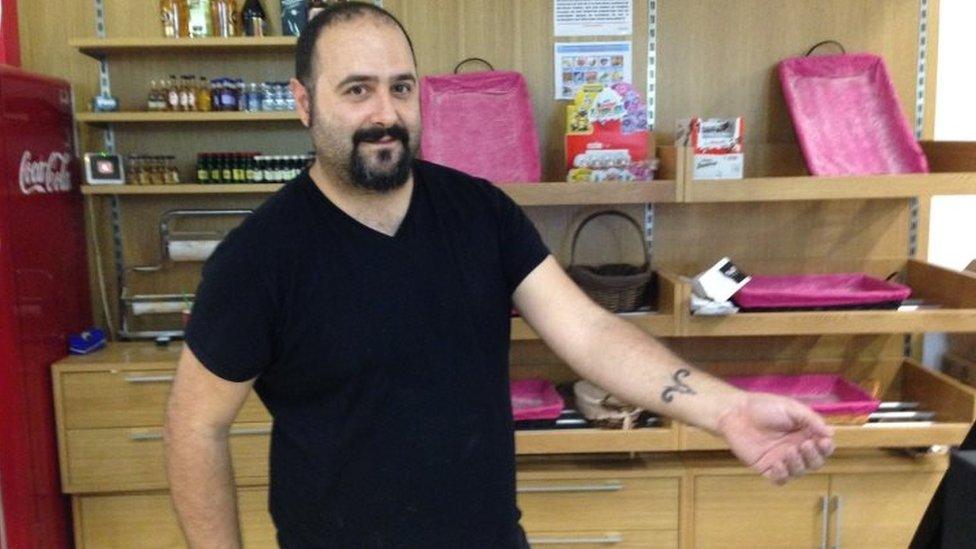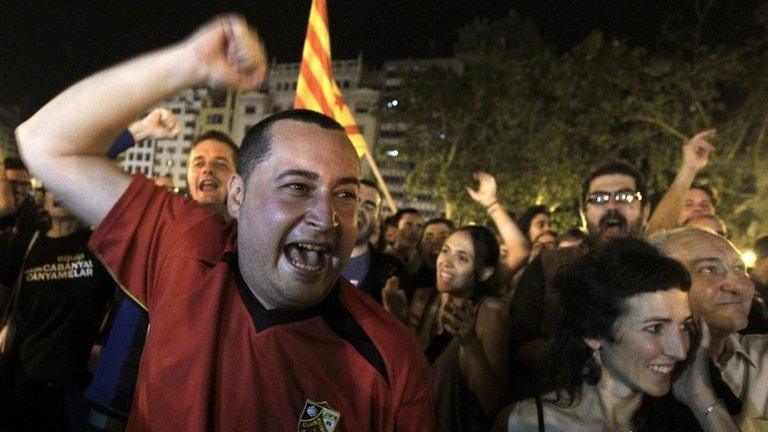Voters in Murcia demand classroom shake-up
- Published
Youth worker Diego Martin Romera says the young need to look past the party posters
When Antonio Angel Lopez Sanchez was at school in the small town of Bullas, in south-eastern Spain, he dreamt of becoming a doctor.
But the dream faded and, at the age of 15, he left school to become a carpenter. Not an unusual step in the country with the highest school dropout rate in the EU.
As Spain prepares to vote on 20 December, in one of the most significant general elections in decades, education has become a key issue for the three parties topping the opinion polls.
Last year, 21.9% of people aged 20-24 were early school leavers, compared with an EU average of 11.1%, external.
"I was a good student but I lost the motivation and I wanted to get some money quickly," Angel tells me when we meet in a cafe in the city of Murcia. "Maybe it was because all my friends left school too?"

While Cristina is impressed by new centrist party Citizens, Angel is yet to make up his mind
It was 2009 and Spain was in the throes of the global economic crisis, with the school dropout rate reaching nearly 31%.
Two years later, the conservative opposition, the Popular Party (PP), swept to power. Angel himself voted Socialist, following a family tradition.
Now he is 26 and learning again, enrolled in vocational training. He studies international commerce, transport and logistics, focusing on a career and future where he can move out of his parents' home, get married and have a child - two if they can afford it.
His girlfriend, Cristina Fernandez Gurrado, 25, has also been doing vocational training. She works in a kindergarten, a step on her way to a teaching degree.
Like Angel, she still lives at home, unable to afford the €350 (£252; $381) a flat would cost her to rent, on her monthly pay of €400.

Education in Spanish election
Popular Party: "Education, the path of opportunities, external", 2nd place in manifesto behind job creation
Socialists: "Towards a Spain of knowledge, external", 1st place in manifesto
Citizens (Ciudadanos): "A national pact for education, external", 3rd place in manifesto behind democratic reform and the economy
Podemos: 30th place in manifesto, external, with a switch to renewable energy in 1st place

This week the BBC will be reporting from across Spain on the issues affecting voters, from Murcia in the south to Castile and Leon and Catalonia in the north.

Bright and confident, Angel and Cristina are busy bettering themselves in a society where, Cristina says, those without a university degree are often underrated.
Perhaps that is especially the case in Murcia, a student city with one of the oldest and most famous universities in Spain.
Strikingly, education seems to be an issue for more people in Murcia than anywhere else in Spain.
An EU survey of public opinion, external conducted in September suggests that, for 28% of the region's population, the educational system ranks only below unemployment as their chief concern - the highest level among all of Spain's regions.
Spain election: Wary of outside influence
This anxiety comes across in different ways in Murcia, from discontent over how college grants are allocated (there is no overall national scheme for student loans like in the UK, for instance) to lack of discipline in classrooms.
'Education for dummies'
Husai de Leon y Salvador, 36, a former Spanish Navy sailor who manages a popular cafe in Cartagena, Murcia's naval port, believes the quality of secondary education has dropped since he was at school in the 1990s.
"I think the curriculum is incomplete," he tells me. "It's too easy. It's education for dummies which doesn't teach children to think for themselves.
"Ask children about the history of their country, of an ancient city like Cartagena that gave the world the first electric-powered submarine, and they know nothing."

Husai de Leon y Salvador cast a blank vote in the 2010 election

The world's first electric-powered submarine is in Cartagena
According to Cristina, teachers lack authority in the classroom where many children come from homes with unemployed parents.
"The children have nothing to do and they protest in the schools all the time," she says.
For Diego Marin Romera, the local director of Euro Accion, external, which works with young people who have dropped out of school, poverty and violence are among the factors driving children to leave school early. Teachers often tell him such pupils "really don't want to do anything at all".
He believes more should be done to improve children's emotional engagement but the idea is taboo in Spain and schools rarely have more than one counsellor to 1,000 pupils.
"I don't think it's just about changing this subject for that, it's about seeing how the children are living."
'Destiny unknown'
"Leaving school early has, I think, a great impact on how young people view politics and the destiny of their country," Diego says.
"You cannot be aware of the importance of the simple act of voting when you do not have appropriate education, when you are not aware of the consequences of your acts."
Political emotion is high in the city of Murcia ahead of the election. On one street you will find shredded PP posters littering the pavement while on another posters for new parties like Citizens (Ciudadanos) and Podemos are trampled underfoot.
Local elections in May badly hit the PP, for decades Murcia's dominant party, but it managed to cling on to power both in the regional government and on the city council, as minority administrations.
However, in the region's second city, Cartagena, they were ejected by an alliance between the Socialists and a local good governance movement.

Campaign posters litter the streets in the city of Murcia
Husai cast a blank vote in 2010 but this year he voted for Citizens, the new liberal, pro-business party which is now Murcia's fourth political force, behind the Socialists and Podemos.
"At this moment, the two big parties, the PP and the Socialists, are obsolete for me and the other option [Podemos] seem to believe in utopia," he says. "I think Ciudadanos have their feet on the ground."
'Job for life'
In the city of Murcia, Cristina also plans to vote Citizens, attracted by a manifesto promise to shake up education by introducing regular evaluations for teachers.
For her, part of the problem with education in Spain is that teaching is regarded as a "job for life".
Angel is yet to decide how he will vote. Some of the PP's ideas for economic growth appeal to him but right now he is looking at either Citizens or Podemos - the anti-capitalist party that Cristina finds too "unrealistic".
"Ciudadanos and Podemos bring new ideas," he says. "So the PP and the Socialists are having somehow to rebuild themselves with new ideas and methods to win back voters."
The man who left school at 15 seems very happy to watch Spain's political class going back to the classroom itself.
For more on Patrick's reports, follow him on Twitter, external.
- Published4 December 2015

- Published25 May 2015

- Published29 July 2015

- Published14 March 2015
